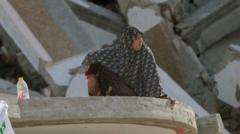Gaza's inhabitants are faced with the daunting task of rebuilding their lives from a near-total loss, while humanitarian aid struggles to meet escalating needs.
**Gaza's Long Road to Recovery: Challenges Await Returning Residents**

**Gaza's Long Road to Recovery: Challenges Await Returning Residents**
As displaced Gazans begin their return, the humanitarian crisis deepens amid destruction and displacement.
The journey home has begun for thousands of displaced Gazans, marking the start of an uncertain and painfully challenging recovery process after 15 months of conflict. The Gaza Strip, being a compact area, sees the return trek not far in physical distance but immense in symbolic weight. Gazan journalist Ghada el-Kurd spoke of the daunting reality awaiting returnees: “We have to re-establish again from the beginning, from zero.”
Immediate essentials, such as food and basic shelter, are starting to be addressed. According to Sam Rose from the UN’s Palestinian refugee agency, Unrwa, the influx of aid has scaled up significantly, allowing for the provision of vital supplies—food, water, blankets, and hygiene items. However, the challenges ahead are immense.
Estimates indicate that around 70% of Gaza’s buildings have been damaged or destroyed since the onset of the conflict in October 2023, with the worst devastation occurring in the north. In Jabaliya, home to a pre-war population of 200,000, much of the area now lies in ruins. Many residents, who previously sought refuge in the south, face the grim reality that makeshift living arrangements will likely continue for the foreseeable future.
Amid demands for extensive aid—such as the urgent appeal for 135,000 tents and caravans—supply issues linger. Mr. Rose noted a significant shortfall in available manufactured tents across the globe, complicating the UN’s efforts to meet the mounting demand. Residents still in the north, who provided shelter for relatives and friends who fled the war, are now faced with renewed pressures as the returnees seek accommodation.
The economic landscape is changing, too. The market, long-stressed by scarcity, is now seeing increased prices as demand rises with the influx of returnees. Despite these challenges, many returning Gazans express a sense of relief and hope, longing to reunite with their homes.
Globally, mixed opinions surround the refugee crisis, particularly regarding the suggestion from former President Donald Trump that Palestinians consider relocating temporarily to Egypt or Jordan. Both countries' officials vehemently opposed this idea, citing potential social and security repercussions.
The situation is dire, and indeed, the aftermath of the war could push more Gazans to consider leaving altogether for better prospects elsewhere, especially given that approximately 150,000 individuals have already sought refuge abroad. With reconstruction delays and pervasive uncertainty, journalist Ghada el-Kurd warns that unless conditions improve swiftly, many may opt for lives beyond Gaza, leaving behind the most vulnerable members of society in search of survival.
Immediate essentials, such as food and basic shelter, are starting to be addressed. According to Sam Rose from the UN’s Palestinian refugee agency, Unrwa, the influx of aid has scaled up significantly, allowing for the provision of vital supplies—food, water, blankets, and hygiene items. However, the challenges ahead are immense.
Estimates indicate that around 70% of Gaza’s buildings have been damaged or destroyed since the onset of the conflict in October 2023, with the worst devastation occurring in the north. In Jabaliya, home to a pre-war population of 200,000, much of the area now lies in ruins. Many residents, who previously sought refuge in the south, face the grim reality that makeshift living arrangements will likely continue for the foreseeable future.
Amid demands for extensive aid—such as the urgent appeal for 135,000 tents and caravans—supply issues linger. Mr. Rose noted a significant shortfall in available manufactured tents across the globe, complicating the UN’s efforts to meet the mounting demand. Residents still in the north, who provided shelter for relatives and friends who fled the war, are now faced with renewed pressures as the returnees seek accommodation.
The economic landscape is changing, too. The market, long-stressed by scarcity, is now seeing increased prices as demand rises with the influx of returnees. Despite these challenges, many returning Gazans express a sense of relief and hope, longing to reunite with their homes.
Globally, mixed opinions surround the refugee crisis, particularly regarding the suggestion from former President Donald Trump that Palestinians consider relocating temporarily to Egypt or Jordan. Both countries' officials vehemently opposed this idea, citing potential social and security repercussions.
The situation is dire, and indeed, the aftermath of the war could push more Gazans to consider leaving altogether for better prospects elsewhere, especially given that approximately 150,000 individuals have already sought refuge abroad. With reconstruction delays and pervasive uncertainty, journalist Ghada el-Kurd warns that unless conditions improve swiftly, many may opt for lives beyond Gaza, leaving behind the most vulnerable members of society in search of survival.






















